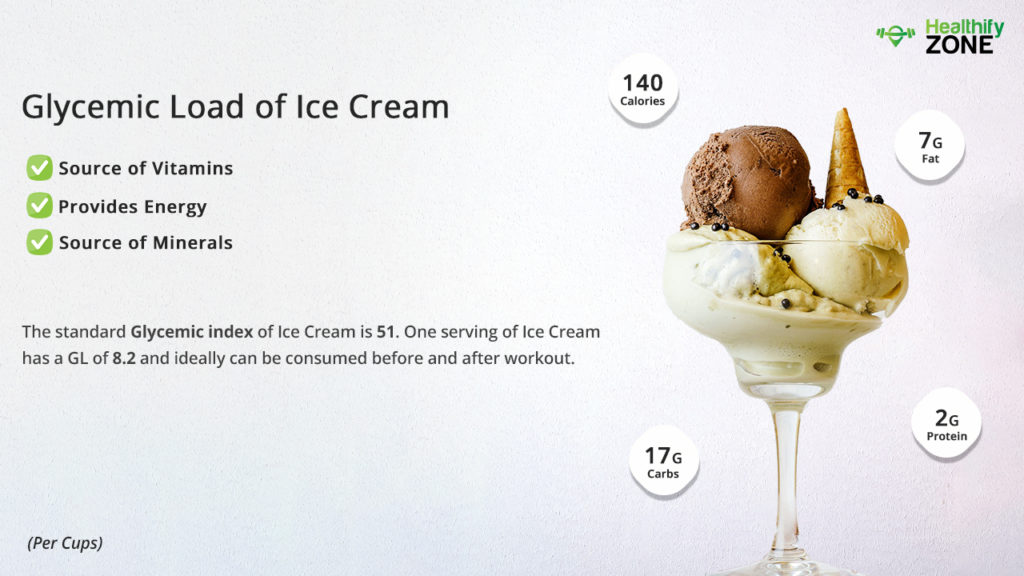Glycemic Load measures the carb content and the sugar content of a food item and how drastically it causes a rise in blood sugar levels. The Glycemic Index assigns a number to each food item based on how quickly it causes a rise in blood sugar levels. It is an easier way of figuring out which is the healthier alternative. Glucose leads to a higher blood glucose response compared to fructose.
Ice cream is a favorite to everyone, and the International GI Tables have found its Glycemic Index to be 51. It is an absolute sugar treat and is loaded with calories, sugar, and fat. These are generally high in calories and very low in nutrients.

Ice Cream is what we usually crave in the summer season, and it barely comprises healthy nutrients. It is primarily consistent of:
Calories
Cholesterol
Protein
Carbs
Sugar
Phosphorous
Calcium
How to Calculate Glycemic Load of Ice Cream?
The standard Glycemic index of ice Cream is 51. The high glycemic index of the foods helps in reducing the risks related to cardiovascular diseases. If we want to talk about diet, the key to prevent diabetes or any chronic illness is to distribute the carbohydrate consumption content throughout the day and manage the sugar levels in the body correctly—interestingly you can have ice-creams once in a while usually after your workout.
The Formula/Procedure For Calculation of Glycemic Index of the Ice Cream :
GL = GI * carbs / 100
where
- GL – glycemic load;
- GI – glycemic index;
- and carbs – the amount of carbohydrates in the portion.

| SL.NO | ICE CREAM BY WEIGHT IN (g) | GLYCEMIC LOAD |
| 1. | 100 g of Ice Cream | 12.2 (low) |
| 2. | 250 g of Ice Cream | 30.5 (high) |
| 3. | 500 g of Ice Cream | 61 (high) |
| 4. | 1 Kg of Ice Cream | 122 (very high) |
| 5. | 1 Serving Ice Cream (66 g) | 8.2 (low) |
Is Ice Cream Safe to Consume If You Have Diabetes?
It is essential for diabetic patients to control and manage their blood sugar levels and insulin sensitivity. Given that ice cream is loaded with sugar, it is definitely not a good choice if you have diabetes. The high GI is proof enough that it would very quickly elevate your blood glucose levels and should not be consumed.
Can I Eat Ice Cream During a Fat-Loss Diet?
Ice cream must not be consumed if you are on a fat-loss diet. Ice cream is full of calories and barely offers any nutrients. However, you can include it in your meal once in a while.

- 100 g of ice cream has 12.2 GL, which can be allowed once in a while.
- Anything more than 100 g of ice cream is something which shoud never be taken if you are on a fat-loss diet.
Can I Eat Ice Cream During a Low-Carbohydrate Diet?
You can consume ice cream on a low-carbohydrate diet. However, it must be very rare. You must not consume more than 100g on such rare occasions.
Is Ice Cream High in Sugar?
100 g of ice cream has 21 g sugar, which is a lot. It is certainly one such food item that you must not consume because it has no nutrients to offer. However, as a part of a healthy diet, you can enjoy it once in a while.